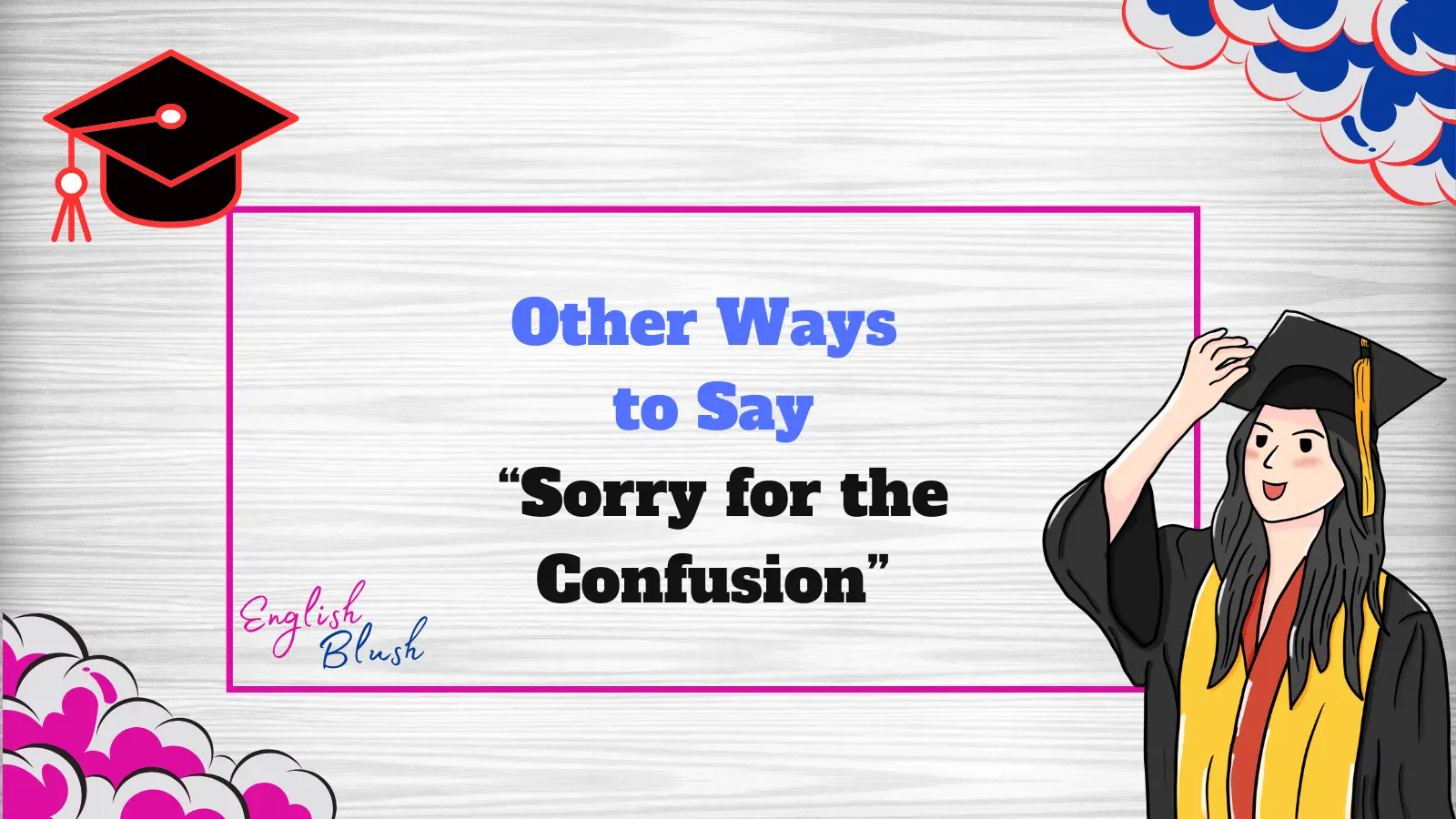Have you ever found yourself apologizing repeatedly with the same phrase—“Sorry for the confusion”? While it’s polite to acknowledge a misunderstanding, using the same expression over and over can feel a bit… uninspired. Whether you’re drafting an email, smoothing over a work issue, or trying to mend a personal miscommunication, finding the right words can make all the difference.
In this article, we’ll explore fresh and impactful alternatives to “Sorry for the confusion.” These phrases will not only help you communicate more effectively but also leave a positive impression on the person you’re addressing. Say goodbye to repetitive apologies and hello to thoughtful, professional responses!
Top List Of Other Ways to Say “Sorry for the Confusion”
- I Apologize for Any Misunderstanding
- I’m Sorry If My Message Was Unclear
- I Regret Any Confusion Caused
- My Apologies for the Oversight
- I Take Responsibility for the Miscommunication
- I’m Sorry for the Lack of Clarity
- I Apologize for the Misunderstanding
- I Regret Any Ambiguity in My Previous Communication
- I’m Sorry for Any Miscommunication on My End
- I Apologize for the Mix-Up
- Please Accept My Apologies for the Confusion
- I’m Sorry for Any Confusion My Words May Have Caused
- I Regret Any Miscommunication That Occurred
- I Apologize for Not Being Clear Enough
- I’m Sorry for the Confusion in My Instructions
- I Regret Any Misunderstanding on My Part
- My Apologies for Any Lack of Precision
- I’m Sorry If I Wasn’t Clear in My Explanation
- I Take Full Responsibility for the Confusion
- I Regret Not Making Things Clearer
- I’m Sorry If I Miscommunicated Anything
- My Apologies for Any Ambiguity
- I’m Sorry for the Mixed Signals
- I Regret Any Miscommunication That May Have Happened
1. I Apologize for Any Misunderstanding
This formal phrase works well in professional settings. It conveys your regret and emphasizes accountability.
Example:
Subject: Clarifying the Project Timeline
Hi Leo,
I apologize for any misunderstanding regarding the project timeline. To clarify, the deadline for submitting the report is this Friday, November 17th. Please let me know if you have any questions or require further clarification.
Thank you for your understanding, Henry
2. I’m Sorry If My Message Was Unclear
This acknowledges your role in the confusion and invites the recipient to share their concerns.
Example:
Subject: Details About Our Meeting
Hi Leo,
I’m sorry if my message was unclear regarding the meeting agenda. To confirm, we will be focusing on next quarter’s sales projections. I’ve attached an updated agenda for your reference.
Looking forward to your input, Henry
3. I Regret Any Confusion Caused
This formal phrase expresses responsibility while remaining neutral.
Example:
Subject: Update on Budget Allocation
Hi Leo,
I regret any confusion caused by the previous email regarding the budget allocation. After reviewing, I can confirm that your department’s request has been approved in full.
Thank you for your patience, Henry
4. My Apologies for the Oversight
This works well when confusion arises from missing or overlooked details.
Example:
Subject: Follow-Up on Contract Revisions
Hi Leo,
My apologies for the oversight regarding Section 3 of the contract. I’ve now included the necessary revisions, and the updated document is attached.
Let me know if anything else needs adjusting, Henry.
5. I Take Responsibility for the Miscommunication
This statement emphasizes accountability and professionalism.
Example:
Subject: Clarifying Project Priorities
Hi Leo,
I take responsibility for the miscommunication about the project priorities. To clarify, the primary focus should be on Task A, with Task B as a secondary priority.
I appreciate your efforts to align with these goals, Henry
6. I’m Sorry for the Lack of Clarity
This phrase is polite and neutral, ideal for situations where ambiguity confuses.
Example:
Subject: Timeline for Deliverables
Hi Leo,
I’m sorry for the lack of clarity in my earlier email. To confirm, the deliverables should be submitted by end-of-day Thursday.
Thank you for understanding, Henry
7. I Apologize for the Misunderstanding
A straightforward way to acknowledge confusion and begin resolving it.
Example:
Subject: Invoice Payment Terms
Hi Leo,
I apologize for the misunderstanding regarding the payment terms. As stated, the invoices are due within 30 days of receipt. Please reach out if this differs from your records.
Best regards, Henry
8. I Regret Any Ambiguity in My Previous Communication
Use this when your wording may have confused.
Example:
Subject: Clarifying Project Assignments
Hi Leo,
I regret any ambiguity in my previous communication about task assignments. To clarify, you are leading the client outreach initiative while Alex focuses on internal operations.
Thanks for your understanding, Henry
9. I’m Sorry for Any Miscommunication on My End
This informal phrase works well in friendly or casual contexts.
Example:
Subject: Lunch Plans Change
Hi Leo,
I’m sorry for any miscommunication on my end about our lunch plans. I meant to say 1 PM instead of noon.
Looking forward to catching up, Henry
10. I Apologize for the Mix-Up
Use this when confusion stems from mixed signals or errors.
Example:
Subject: Reservation Time Correction
Hi Leo,
I apologize for the mix-up with the reservation time. It’s booked for 7 PM, not 8 PM.
Thank you for your flexibility, Henry
11. Please Accept My Apologies for the Confusion
A polished and formal alternative for professional communication.
Example:
Subject: Correction on Travel Itinerary
Hi Leo,
Please accept my apologies for the confusion regarding your travel itinerary. I’ve attached the updated version with accurate departure times.
Safe travels, Henry
12. I’m Sorry for Any Confusion My Words May Have Caused
This personalizes the apology, showing genuine regret.
Example:
Subject: Follow-Up on Policy Update
Hi Leo,
I’m sorry for any confusion my words may have caused during the meeting. To clarify, the new policy applies only to incoming hires, not current employees.
Let me know if further details are needed, Henry.
13. I Regret Any Miscommunication That Occurred
This phrase suits situations where the fault may be shared.
Example:
Subject: Client Feedback Adjustment
Hi Leo,
I regret any miscommunication that occurred regarding the client’s feedback. Let’s set up a call to discuss their expectations further.
Best, Henry
14. I Apologize for Not Being Clear Enough
This acknowledges your role in the misunderstanding directly.
Example:
Subject: Clarifying Reimbursement Policy
Hi Leo,
I apologize for not being clear enough in explaining the reimbursement policy. Employees must submit receipts within 14 days to qualify.
Thanks for bringing this to my attention, Henry
15. I’m sorry for the Confusion in My Instructions
Best used when confusion arises from unclear directions.
Example:
Subject: Updated Guidelines for Submission
Hi Leo,
I’m sorry for the confusion in my instructions regarding the file naming conventions. The correct format is “ClientName_Date.”
Thanks for your diligence, Henry
16. I Regret Any Misunderstanding on My Part
This adds a humble touch, showing accountability.
Example:
Subject: Misaligned Expectations
Hi Leo,
I regret any misunderstanding on my part about your availability. I now see that you’re busy this week and will reach out next Monday.
Thank you for your patience, Henry
17. My Apologies for Any Lack of Precision
This phrase is useful when confusion stems from imprecise language or details.
Example:
Subject: Correcting Product Specification Details
Hi Leo,
My apologies for any lack of precision in the earlier product specifications I shared. To clarify, the model supports up to 500 users, not 1,000 as initially mentioned.
Please let me know if you need any further clarifications. Best regards, Henry
18. I’m Sorry If I Wasn’t Clear in My Explanation
This softer apology works well for interpersonal communication where clarity is the issue.
Example:
Subject: Explaining the New Office Layout
Hi Leo,
I’m sorry if I wasn’t clear in my explanation about the new office layout. Your desk will now be located in the west wing, near the meeting rooms.
Let me know if this arrangement works for you, Henry
19. I Take Full Responsibility for the Confusion
This phrase demonstrates strong accountability, making it suitable for formal situations.
Example:
Subject: Miscommunication on the Report Deadline
Hi Leo,
I take full responsibility for the confusion about the reporting deadline. To clarify, it is due by end-of-day Friday.
Thank you for your understanding as we resolve this, Henry
20. I Regret Not Making Things Clearer
This apology acknowledges room for improvement in your communication.
Example:
Subject: Clarification on Event Logistics
Hi Leo,
I regret not making things clearer about the event’s logistics. The venue is Green Hall, and parking is available at Lot C.
Thanks for pointing this out, Henry
21. I’m Sorry If I Miscommunicated Anything
This is a diplomatic way to accept partial responsibility for confusion.
Example:
Subject: Addressing Schedule Changes
Hi Leo,
I’m sorry if I miscommunicated anything regarding the schedule changes. The new meeting time is 10 AM on Thursday, as confirmed by the team.
Please let me know if this works for you, Henry.
22. My Apologies for Any Ambiguity
Use this when unclear language might have contributed to confusion.
Example:
Subject: Clarification on Policy Application
Hi Leo,
My apologies for any ambiguity in the policy document. To clarify, this rule applies only to employees who joined after 2022.
Please let me know if you have further questions, Henry.
23. I’m sorry for the Mixed Signals
This is a friendly and conversational way to address confusion.
Example:
Subject: Feedback on Project Outline
Hi Leo,
I’m sorry for the mixed signals in my comments on your project outline. After reviewing, I fully support your proposed approach and have attached a few minor suggestions.
Thanks for your understanding, Henry
24. I Regret Any Miscommunication That May Have Happened
This phrase works well when confusion is due to mutual miscommunication.
Example:
Subject: Misalignment on Task Assignments
Hi Leo,
I regret any miscommunication that may have happened regarding task assignments. Let’s schedule a quick call to align expectations and ensure clarity moving forward.
Best regards, Henry
Conclusion
Addressing misunderstandings with professionalism and empathy helps build trust and maintains strong relationships. By using these 24 alternative ways to say “Sorry for the confusion,” you can tailor your apologies to fit the situation, whether it’s formal or casual. Remember, clarity and accountability go a long way in resolving conflicts and improving communication.





